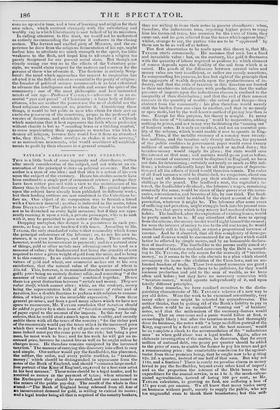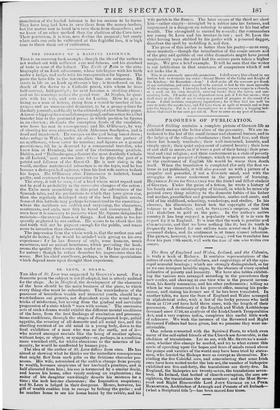TAYLOR ' S CATECHISM OF THE CURRENCY.
Tuts is a little book of seine ingenuity and shrewdness, written after much consideration of the subject, and not without an ex- amination of the principal writers on political economy. But the author is a man of one idea ; and that idea is a notion of his own upon the suhject of the currency. Hence his studies seem to have been confined to a single part of economical science; perhaps they have been rather pursued with a view to the maintenance of his theory than to the actual discovery of truth. His partial opinions upon the subject have already been published in different works, but their leading outlines are now combined in the Catechism be- fore us. One object of its composition was to furnish a friend with a Currency manual ; another is indicated in the motto, taken from DAVENANT—"The pilots to whom the vessel is trusted are not to be disturbed on every light occasion; but if they are appa- rently running it upon a rock, a private passenger, who is to sink with it, may be permitted to give notice of the danger."
Dropping metaphor, this danger is a persistence in cash pay- ments, so long as we are burdened with taxes. According to Mr. TAYLOR, the only standard of value is that commodity which forms the principal subsistence of the labourer; or, to use his own in- stances, it is corn in Europe, and rice in Asia. These articles, however, would be inconvenient in payment ; and in a natural state of things, gold or other metals may advantageously be used as a measure of value; the fundamental test being the quantity of corn required to raise a given weight of gold from the mine, and to bring it to this country. In an elaborate examination of the respective values of gold and wheat, our economist makes out to his own satisfaction, that the natural value of the quarter of Wheat is 33s. 6d. This, however, is its unmixed standard measured against gold; price being an entirely distinct affair, and consisting " of the measure of value and of taxation" combined together. Hence there is a great distinction between "metals and money. They are value itself, which cannot alter ; while, on the contrary, money being the representative both of the measure of value and of taxation, has a double function to perform with relation to commo- dities, of which price is the invariable expression." From these general premises, and from a good many others which we have not space to enumerate, Mr. TAYLOR concludes that taxation should be added to prices by a state issue of "taxation money," consisting of paper equal to the amount of the imposts. In this way he cal- culates, that he could steal a march upon the wealthy, and secretly saddle them with all the taxes of the country ; "for the richer part of the community would pay the taxes at last in the increased price which they would have to pay for all goods or services. The poor man indeed must pay the same price as the rich ; but being a poor man, he must work to live; and for his work he will get an in- creased price, because he cannot live as well as he ought unless he charges more. He therefore remains uninjured by the increased taxation." The manner of carrying this discovery into effect is easy and simple. Our author would pay the fundhohler, the placeman, the soldier, the sailor, and every public creditor, in " taxation- money ;" which should be distinguished in appearance from time notes of the Bank of England, and should "contain a large medal- lion portrait of the King of England, engraved by a first-rate artist in his best manner." These notes should be a legal tender, and be received as money in the payment of tames; when returned to the Exchequer they should be cancelled, and new ones issued on the return of the public pay-day. The result of the whole is thus stated—" The Bank of England being released from all fear of an inconvenient demand for gold, is willing to extend its issues; and a legal tender being all that is required of the country bankers,
they are willing to issue their notes in greater abundance : when, therefore, the industrious men, requiring higher prices to repay him his increased taxes, has occasion for the issue of them, they come out, and he gets relieved from the taxes which oppress him ;" whilst, strange to say, the parties who are to be " oppressed " by them are to be as well Was before.
The first observation to be made upon this theory is, that Mr. TAYLOR starts erroneously. He assumes that corn has a fixed
and invariable value : but, on the contrary, like gold it fluctuates with the quantity of labour required to produce it ; which element of course depends upon the fertility of the soil from which it is
raised. His proofs of the difference between natural value and money value are very insufficient, or rather are merely assertions. In compounding his panacea, he has lost sight of the principle that the aggregate of wealth depends upon the productiveness of in- dustry, and that the evils of taxation in this direction are limited to their mischievous interference with production; that the unfair pressure of imposts upon the industrious classes is confined to the inequality of' their distribution ; and that the evil of their amount consists in the quantity of wealth—the actual good things—they abstract from the community : his plan therefore would merely shift the burden from one class to another, and that in no manly or open mode, but by the well-known method of paying less than.is due. Except for this purpose, his theory is nought. In many cases the issue of " taxation-money " would be inoperative, adding nothing to prices, and not in any way facilitating the "coming out" of bankers' notes. It is only an accident, and not an essential qua- lity- of the scheme, which would enable it now to operate in Eng- land. Thus, if the metallic currency of a comitry were twenty- five millious, and the taxation only twenty millions, the payment of the public creditors in government paper would cause twenty millions of metallic money to be exported or melted down ; the taxation-money would supply its place ; the state would save the interest on that sum ; and matters would go on just as before. What amount of currency would be displaced in England, we have not data for determining ; certainly not nearly so much as fifty mil- lions ; a balance sufficiently large for all time purposes of deprecia- tion and all the effects of fraud would therefore remain. The value of all fixed incomes would be diminished, we conjecture, about one third ; and all debtors would pay their creditors some thirteee shillings in the pound. The landlord's rent, the capitalises in- terest, the fundholder's dividends, the labourer's wages, remaining nomioally the same, would be shorn of their power over tile neces- saries, conveniencies, and luxuries of life, by one third. The fund- holder of course would be robbed by the exact amount of the de- preciation, whatever it might be. The labourer after some years of suffering and privation, might struggle back into his present con- dition, less that quota which long misery had rendered alien to his habits. The landlord, after the expiration of existing leases, would be pretty much as he is. If any stimulant effect were to spring from the scheme, the money deeder would right himself the soonest; for were the interest of money to rise to the old war terms, he would immediately call in his capital, or exact a proportional increase of income. And be it observed, that all this complexity of derange- ment and distress would be encountered for an object which could better be effected by simple means, and by an honourable declara- tion of insolvency. The fundholder is the person really aimed at: the amount of taxation rendered necessary by the Debt is, accord- ing to Mr. TAYLOR, the sole reason for the necessity of" taxation- money," as it seems to be the sole obstacle to a plan which should accompany its issue—the abolition of the Corn-laws, and an un- limited freedom of trade. These last-named measures are great ; properly worked, we believe them to be judicious, for they would increase production and add to the sum of wealth, as we have often said before ; but they have no necessary connexion with " taxation-money," would operate independently of it, and upon totally different principles. In these remarks, we have confined ourselves to the distin- guishing characteristic of Mr. TAYLOR'S scheme of a new way to pay old debts. Were the work to be examined scientifically, very many other points might be selected for animadversion. The author thinks, that by getting rid of the Bank's liability to pay in gold, there would be an unlimited " coming out" of bankers' notes, and that the millennium of the currency-doctors would arrive. That an over-issue and a panic would follow at first, is exceedingly likely ; but after the taxation-money had thoroughly done its business, the notes with "a large medallion portrait of the King, engraved by a first-rate artist in the best manner," would be as complete a check to the accommodation of the " industrious man" as when gold alone was a legal tender. Again, after an elaborate investigation of the matter, he discovers, that for every million of national debt, one penny per quarter should be added to the price of corn, to enable the farmer to pay his taxes and get a remunerating price; the comfOrtable conclusion for the agricul- turist from these premises being, that he ought now to be getting 82s. 2d. a quarter, instead of one half of that sum. 'But why not 110s. and a fraction? There is surely no peculiar charm in money levied to pay the fuedholder, beyond every other kind of impost ; and as the proportion the interest of the Debt bears to the expenditure for the annual service, is as 4 to 3, the much-calum- niated agriculturists, instead of losing 100 per cent., as Mr. TAYLOR calculates, in growing us food, are suffering a loss of 175 per cent, per annum. We all know that many trades carry on business without profit, merely to supply the public, who aro too ungrateful even to thank their benefactors; but this self-
immolation of the landed interest is far too serious to be borne. They have long had laws to save them from the money-lenders, but the matter now in hand is to save them from themselves ; and we know of no other method than the abolition of the Corn-laws. 'Their patriotism, it is true, may decline the proposal ; but surely when soils can only be cultivated at this frightful loss, it is high time to throw them out of cultivation.

























 Previous page
Previous page